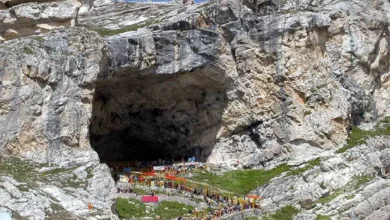Mount Fuji: Japan's Towering Icon – A Journey Through History, Culture, and Breathtaking Beauty
 |
| Mount Fuji – Japan |
A Land of Fire and Ice: The Allure of Mount Fuji’s Location
Mount Fuji sits astride the idyllic Fuji-Hakone-Izu National Park, on the island of Honshu, Japan’s largest island. Straddling the prefectures of Shizuoka and Yamanashi, it boasts a unique location that merges breathtaking natural beauty with a rich cultural landscape.
Majestic in its isolation, Mount Fuji rises from a relatively flat plain, making its near-perfect conical form even more prominent. This positioning creates a dramatic visual spectacle, with the snow-capped peak often visible from the bustling metropolis of Tokyo on clear days.
A Cradle of Creation: Mount Fuji’s Volcanic History
Mount Fuji’s fiery past is a significant part of its allure. Formed through a complex series of volcanic eruptions that began approximately 100,000 years ago, it’s classified as an active volcano, with its last eruption occurring in 1707-1708. However, reassurance comes from the fact that volcanic activity since then has been minimal.
The volcanic history has also played a role in shaping the surrounding landscape. Five idyllic lakes, Lake Kawaguchi, Lake Yamanaka, Lake Sai, Lake Motosu, and Lake Shōji, lie nestled at the base of Mount Fuji, a testament to the power and beauty of nature’s forces. These serene lakes, along with nearby Lake Ashi, offer stunning reflections of the mountain, creating a picture-perfect postcard scene.
 |
| Mount Fuji – Japan |
A Spiritual Beacon: Mount Fuji’s Enduring Historical Significance
Mount Fuji’s cultural significance transcends its geographical presence. It’s been revered as a sacred mountain for centuries, featuring prominently in Japanese mythology and religious traditions. Shinto, Japan’s indigenous religion, considers Mount Fuji a home to the gods, a place of immense spiritual power.
Pilgrimage has been a central aspect of Japanese culture for centuries, and Mount Fuji is no exception. The ascent to the summit is considered a spiritual journey, a test of both physical and mental fortitude. The numerous shrines and temples scattered around the mountain further solidify its place as a sacred site.
Mount Fuji’s artistic influence is undeniable. It has served as a muse for countless Japanese artists and poets for centuries. From the iconic woodblock prints of Hokusai and Hiroshige to modern photography, Mount Fuji continues to inspire artistic expression, capturing the essence of Japan’s natural beauty and cultural heritage.
A Mountain of Marvels: Unveiling the Facts and Stats
Beyond its cultural significance, Mount Fuji boasts some fascinating facts and statistics:
- Height: 3,776 meters (12,388 ft), making it the highest mountain in Japan.
- Age: Estimated to be around 100,000 years old.
- Last Eruption: 1707-1708.
- Crater Width: Approximately 700 meters (2,300 ft).
- World Heritage Site: Designated in 2013 by UNESCO, recognizing its cultural and natural significance.
- Climbing Season: Officially open from July to mid-September due to harsh weather conditions.
- Estimated Climbers: Over 200,000 people attempt the summit climb each year.
A Timeless Wonder: The Enduring Allure of Mount Fuji
Mount Fuji is more than just a mountain; it’s a symbol of resilience, beauty, and spiritual significance. Standing as a silent sentinel over Japan’s landscape, it continues to inspire awe and reverence. Whether you’re a seasoned climber seeking a challenging ascent or an armchair traveler marveling at its beauty from afar, Mount Fuji offers a unique window into the heart and soul of Japan. So, the next time you think of Japan, remember the majestic Mount Fuji, a testament to the enduring power of nature and the rich cultural tapestry it has helped weave.



